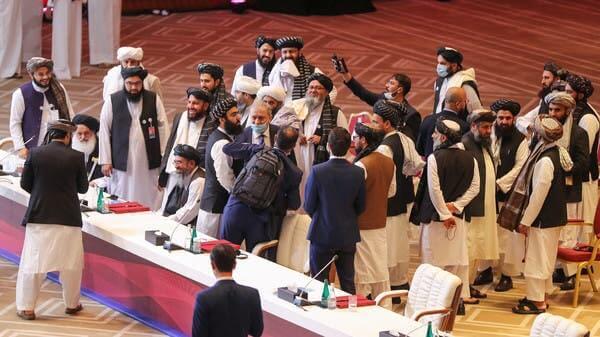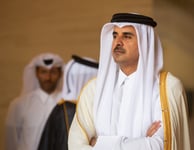
Representatives of the Afghan government and the Taliban met in Doha on Saturday for talks as fierce battles rage on the ground as foreign forces withdraw from Afghanistan after a 20-year presence.
The two sides have been holding intermittent talks for months in the Qatari capital, but well-informed sources indicated that negotiations are slowing down as the Taliban advance on the battlefield.
A number of senior officials, including Abdullah Abdullah, head of the government council overseeing the peace process and the former prime minister, gathered in a luxury hotel in Doha on Saturday after dawn prayers. They were joined by negotiators from the Taliban’s political office in Doha.
Former Afghan President Hamid Karzai was due to join them, but he stayed in Kabul at the last minute, Najia Anwari told AFP reported by Yahoo News.
“The high-level delegation is here to talk to the two sides, guide them and support the (government) negotiating team to speed up talks and make progress,” Najia Anwari, a spokeswoman for the government’s negotiating team, told AFP, expressing hope that the two sides would reach an agreement soon.
“We expect this to speed up the talks…and within a short time the two sides will reach a conclusion and we will witness a lasting and dignified peace in Afghanistan,” she said.
And Mustafa Mastour, senior advisor to the Supreme Commission for National Reconciliation in Afghanistan, confirmed yesterday, Friday, that talks with the Taliban movement will start today, Saturday, and will last for two days, to discuss core issues aimed at bringing peace to the country.
Mastour said, in a statement, that the movement seeks, during negotiations, to change the constitution and the system of government in the country.
He added: “There is a delegation consisting of 9 members of the political elite who headed to Doha to participate in the negotiations with the Taliban, which will start on Saturday and will last for two days to discuss substantive issues and we will see if there is enough time … the offer made to the Taliban movement to come to Afghanistan and hold talks because the matter is related to With intra-Afghan talks, the Supreme Council for National and Reconciliation and the Chairman of the Council invited the Taliban to discuss, but we believe that at the present time there is a desire to discuss the core issues in Doha, and this is what concerns us to bring peace to Afghanistan.”
It is noteworthy that the idea of dialogue with the Taliban was proposed by former Afghan President Hamid Karzai in 2004 and was adopted by Washington in 2009. However, these efforts were at several stages hampered by the excesses of the Taliban and ended with Washington in an agreement in February 2020. As for the Afghan-Afghan talks, the Taliban announced Resuming negotiations with the government a few days ago.
An eye on the field and another on the news of political developments, specifically those that revolve around the possibility of the return of negotiations between the Taliban and the government, is the case of the Afghan street today, waiting for that news to reduce the noise of the war that accompanied the Taliban attacks on vast areas in the country, taking advantage of the American withdrawal.
As for the history of those negotiations, they are not a product of the moment, as they were proposed in 2004 by then Afghan President Hamid Karzai, and in 2008 reached the stage of convincing Taliban leaders to hold some meetings, some of which were conducted inside Afghanistan, but they did not turn into a political alternative except with the proposal of the White House in 2009, and was known in the media as the new US strategy in Afghanistan.
The announcement of this strategy was followed by the establishment of the High Peace Council to oversee the dialogue and reconciliation project led by former Afghan President Burhanuddin Rabbani, but it stopped in 2010 after the Taliban’s assassination of Rabbani, which was understood as a negative message from the movement towards the reconciliation project.
Despite the tendency of the United States and the Taliban to overcome this incident and limit its impact on the relations between the Karzai regime and the Taliban and neutralize its influence on communications between the United States and the movement, it stumbled again.
The decline in the strength of the Taliban under the pressure of American operations prompted the leaders of the first row in the movement to accept the principle of direct dialogue, whether with Washington or with the Afghan government, which began in 2018 in Doha.
And it ended in February 2020 with the United States signing a conditional peace agreement with the Taliban , which calls for the withdrawal of foreign forces within 14 months in exchange for the movement’s commitment to the American conditions, while coinciding with its progress on the ground, the Taliban announced a few days ago the resumption of negotiations with the Afghan government delegation in Doha.













